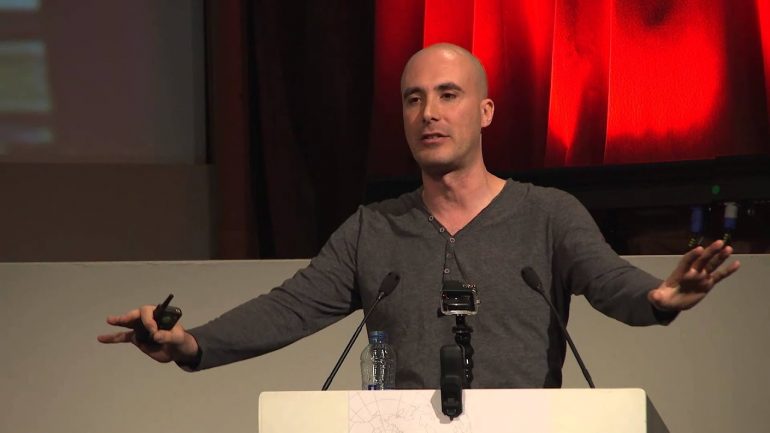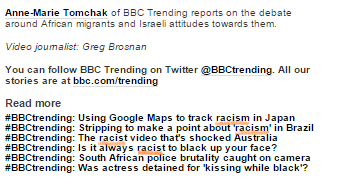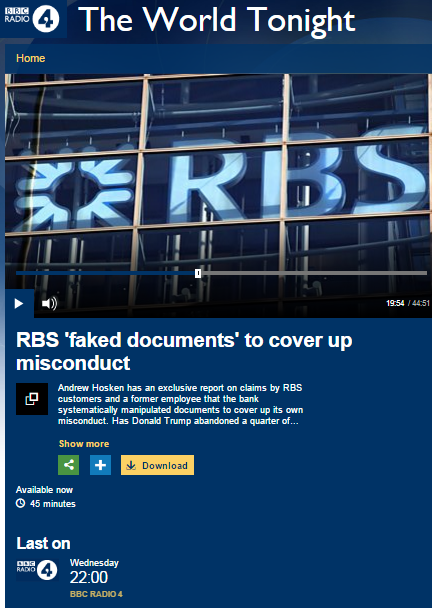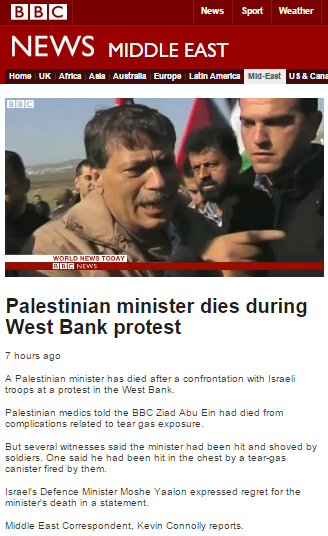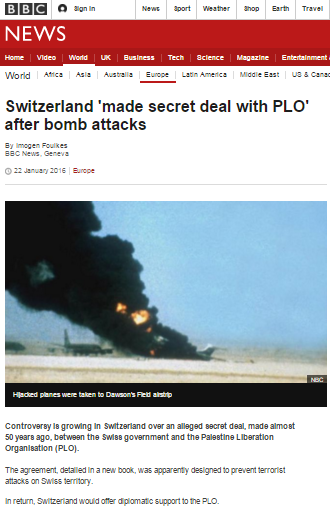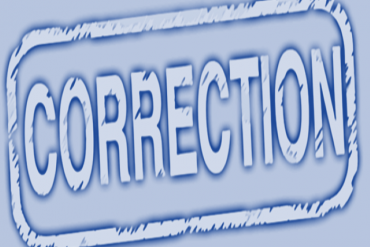October 15th saw the appearance on the BBC News website’s Middle East And Magazine pages of the latest in a growing collection of BBC reports about African migrants in Israel which – rather than informing audiences of the real issues behind that very complex issue – employ the topic to promote the theme of Israel as a racist society.
Titled “#BBCtrending: Israel’s unwelcome African ‘infiltrators’“, the filmed report by Anne-Marie Tomchak opens: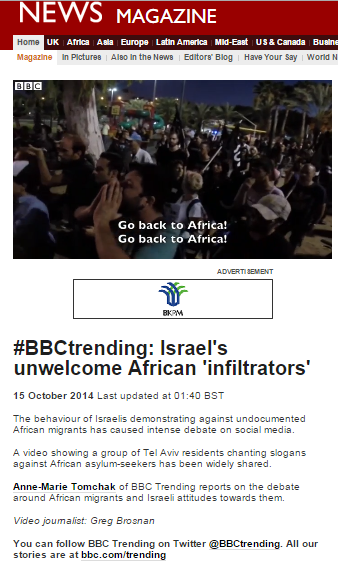
“In Israel, even the polite term for thousands of African migrants is ‘infiltrators’. But in this widely shared video the anti-African chants were much more offensive. It was posted on Youtube a week ago by a campaigner.”
In fact, the Hebrew word מסתננים is not used exclusively to describe African migrants, but anyone who has crossed a border illegally – as all those migrants have. Tomchak’s report goes on to feature an interview with the “campaigner” who posted the video, with that description also being the term used to describe David Sheen in the on-screen text appearing in her report.
Sheen: “This latest rally that I captured on film – there were about approximately about 120 people there – Jewish Israelis – marching through south Tel Aviv in the direction of a park that is often frequented by African immigrants to Israel. It’s a confluence of being non-Jewish and non-white which causes the vociferous hatred.”
Tomchak makes no attempt to examine the veracity of Sheen’s claim and continues:
“Tens of thousands of Christian and Muslim Africans have come to the Jewish state. They call themselves refugees. The state calls them illegal immigrants. The people in this video were protesting against a High Court decision to close a detention centre where thousands of Africans are held. Now many could end up on the streets.”
Next viewers see a ‘balancing’ interview with Michael Freund of the Jerusalem Post who explains:
“One can also understand the residents of south Tel Aviv who for many years now have seen their neighbourhood overtaken by an influx of illegal migrants. A sense of lawlessness now pervades that part of the city.”
Tomchak fails to expand on that very relevant aspect of the story, going on to say:
“There’s been a mixed reaction online to this video. African migrants have taken to social media to highlight their circumstances. We contacted the man behind this page who said he was in one of the centres.”
Anwar Suliman: “I’m leave my country 2003 when the war start in Sudan in Darfur. Sudan is bad, you know, the war. The situation is dangerous. Where I can go?”
Tomchak: “Israel sees itself as a country offering sanctuary for many fleeing antisemitism and persecution. As the intense debate over this video shows, dealing with asylum seekers hits a very raw nerve.”
Tomchak’s entire report is constructed around the video posted by David Sheen which in fact showed just one of the demonstrations which took place in south Tel Aviv following the High Court’s decision on September 22nd. With the purpose of Sheen’s video obviously being to publicise the issue of racist chants at that gathering and his subsequent commentary referring to “vociferous hatred” supposedly caused by the fact that the African migrants are “non-Jewish and non-white”, it would of course have been appropriate for Tomchak to inform viewers that the participants in that particular demonstration were mostly a group of far-right activists (Sheen claims 120 – the Jerusalem Post reported “several dozen”) rather than a cross-section of Israeli society as a whole.
Anne-Marie Tomchak should obviously also have adhered to BBC editorial guidelines on impartiality by ‘summarising the standpoint’ of her interviewee and main source, providing rather more information than the meaningless description “campaigner”.
It would, for example, have been highly relevant to inform BBC audiences that David Sheen has written for a number of outlets, including Ha’aretz, along with additional ones identified with specific political views and/or anti-Israel campaigning: 972 Magazine, Mondoweiss, Electronic Intifada and an obscure outlet called Muftah which, in its ‘about’ section notably states:
“While we are committed to free speech, we do abide by certain red lines. First, we will not publish pieces that advocate violence, war, occupation, or racial, ethnic, or religious discrimination. Second, we are solidly pro-Palestinian and will not publish pieces that are contrary to this perspective.”
BBC audiences should also have been informed that Sheen recently ‘gave evidence‘ supposedly showing Israeli ‘incitement for genocide’ at the latest gathering of the self-appointed anti-Israel pseudo-legal farce titled ‘The Russell Tribunal on Palestine’. The fact that Sheen is currently on a speaking tour in the US and collaborating with the anti-Israel, BDS –supporting SJP and has also collaborated with anti-Israel activist Max Blumenthal is information which would have helped BBC audiences to put Sheen’s claims into their correct context.
But predictably, BBC audiences were not informed of the political motives of Anne-Marie Tomchak’s main source because the prime aim of this report is to keep the pilot light of ‘Israel as a racist society’ burning. Just in case audiences did not get the message, Tomchak’s item was presented on the website together with a series of additional reports under the heading “Read more” which clearly signpost the conclusion viewers were intended to take away.
The issue of African migrants in Israel is a complex one about which BBC audiences have yet to be adequately informed and Tomchak’s report certainly contributes nothing to the BBC’s obligation to “build a global understanding” of the issue. Rather, Tomchak actually misleads audiences by promoting Sheen’s politically motivated simplistic ‘explanation’ of the topic and compromises the BBC’s impartiality by providing a platform for the delegitimisation of Israel by an inadequately identified professional campaigner.

